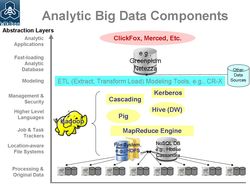
(The original of this chart appears at Wikibon, and the page describing it is well worth your time.)
That's the credo of communism. Evil, right? Leads to dictatorship, right?
It can. It has. But conservative businessmen still find a way to embrace it, in open source.
That's really what the Big Data plans of Cloudera, Couchbase, Revolution Analytics and Jaspersoft are all about.
If all the elements in data management – cleaning, storing, analyzing and presenting data – can be delivered through open source cooperation, all businesses will gain a huge benefit.
Take careful note of the sponsor names. They're all small outfits. That's because the Data Stack attacks the center of the control big companies like IBM, Oracle, Microsoft and SAS retain over their customers.

This is why, while some new businesses are going to the Cloud, and consumers can use cloud services, the revolution isn't here yet. If you can't open source the cleaning, storing, analysis and presentation of big data, so executives can execute strategy, then the Fortunate 500 can't commit to you.
Naturally, the four sponsors have pieces of the puzzle. This is the “from each according to his ability” bit. Cloudera offers cloud infrastructure technology through Hadoop. Couchbase is a noSQL database vendor. Revolution Analytics supports R, the Big Data statistical analysis tool. And JasperSoft does open source business analytics.
What's missing is the middleware to turn all these pieces into a coherent hole, and the hope is that some big vendor might step in and provide that expertise. Hint, hint. Internet Revolution, the site extolling Big Data, is sponsored by IBM.
Why would IBM, or any other big vendor, want to support an open source approach to Big Data? For the same reason such companies support Mozilla and Open Office. Remove the props holding up your big competitors and you can eat their cheese. IBM has unified its own offerings with open source over the last 15 years, it knows how to make money in that world, so eliminating the Big Data proprietary advantage rivals hold would benefit it.
But you don't want to say that too loud. IBM has learned, as Google has learned in Internet services, that the best way to grow is by keeping your big secret in the background. In this case the big secret is that Big Data benefits IBM. Much better to let a bunch of small fry get together, maybe through a foundation (like Eclipse), and deliver what businesses need. IBM can help, and it may do most of the heavy lifting in the background.
But IBM can never be accused of advocating communism. So IBM keeps its mouth shut. Loose lips sink chips.









